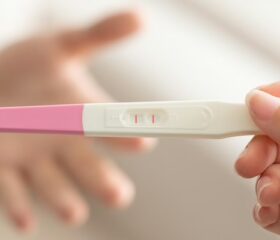Preconception Appointment: Why You Need One and What to Ask
Now that you’ve decided to start a family, it’s time to prepare for it. That means a visit to the doctor’s office.

- What is a preconception checkup?
- How to come prepared for your preconception appointment
- What kinds of tests and screenings will your doctor run?
- Will you need vaccines before or during pregnancy?
- What to ask your doctor during your preconception checkup
- Should your partner schedule a checkup of his own?
- Final thoughts
Many parents-to-be head to the doctor for a preconception checkup a few months to a year before they start trying to make a baby.
Let’s look at what this checkup entails, how you and your partner should prepare, and what questions you should ask your doctor.
What is a preconception checkup?
A preconception (or pre-pregnancy) checkup is an appointment where you discuss your current health, plus any other factors that could affect your fertility, pregnancy, or the health of your future baby.
During the appointment, your doctor will:
- Ask about your medical history
- Ask about your family’s health history
- Give you a comprehensive physical exam
- Administer vaccines (if you’re missing any necessary ones)
- Give you tips for boosting your fertility
- Discuss potential risks and complications and how to combat them
In a nutshell, your doctor’s goal is to make sure you’re in the best possible state to get pregnant. 1 2
Which type of healthcare provider should you make an appointment with?
Different types of providers do pre-pregnancy checkups, though not all of them are medical doctors. Your options include:
- OB/GYN
- Family medicine doctor
- Nurse practitioner
- Midwife
- Maternal-fetal medicine (MFM) specialist
It’s up to you who you choose to see. If you see a non-physician and they discover anything that concerns them, they may refer you to a doctor.
How to come prepared for your preconception appointment
Just like with other doctor appointments, your preconception appointment will begin with a lot of questions.
During your appointment, your doctor will go over your:
Medical history
Your doctor will begin by reviewing your medical history in detail. They’ll ask you about:
- Previous illnesses
- Allergies
- Chronic conditions
- Past surgeries
- Hospitalizations
- Your mental health history
Your doctor uses this information to zero in on high-risk conditions that could impact your pregnancy, such as high blood pressure or diabetes. 3 4
Family history
It’s not just your medical history your doctor needs to check out; your family history could also impact your health during your planned pregnancy.
Your doctor will ask you whether your family has a history of:
- Chronic conditions
- Cancer
- Genetic disorders
- Pregnancy complications
Your partner’s family history may also impact your pregnancy, especially if certain conditions run in both sides of the family. Bring information about his side, too.
Lifestyle and habits
You’re about to have another life growing inside you, so your lifestyle will affect more than just you from this point forward.
Your doctor will ask (and probably give you advice) about:
- Smoking, drinking, and drug use: Using any kind of recreational drug (including wine and other alcohol, which you can’t drink while you’re pregnant) or smoking while trying to conceive increases the risk of serious issues, including sudden infant death syndrome (SIDS), fetal alcohol spectrum disorders, premature birth, and neural tube defects. 5
- Diet: Unpasteurized goods, high-mercury seafood, and deli foods are too risky to consume during pregnancy. 6 Although you can still have coffee while you’re pregnant, along with tea and chocolate, too much caffeine can also harm your growing baby. 7 Your doctor will tell you which foods to avoid when you’re pregnant and give you tips on adopting a more pregnancy-friendly diet.
- Weight management: Your doctor will want to know about how you manage your weight. This is important; obesity can increase the chances of congenital heart defects in babies by 15%, and being underweight could cause your baby to have a low birth weight. 8 9 10
- Exercise: Regular exercise will keep you and your baby healthy throughout your pregnancy. It’ll also reduce your chances of developing gestational diabetes. When you’re pregnant, you should try to get about 150 minutes of moderate activity every week. 8 9
- Sleep: A lack of sleep is taxing on your body, leading to higher stress levels and blood pressure. This increases your risk for preterm labor, as well as a low baby birth weight. 5
- Hot tub and sauna use: When you’re pregnant, conditions that overheat the body for long periods increase the likelihood of birth defects. Even before that, hot tubs and saunas can be harmful to your male partner’s fertility (usually temporarily). 11 9 12
- Contact with animals: They may also ask if you have pets. In particular, being exposed to cat or rodent feces can put you at risk of contracting toxoplasmosis during your pregnancy (an infection from the parasite Toxoplasma gondii), which is more dangerous for pregnant women. 9 12
Gynecological history
Your obstetric history can have a huge impact on your fertility, as well as the health of your pregnancy. Because of this, your doctor will ask about your:
- Menstrual cycle: They’ll want to know when your last period was, how long your menstrual cycle normally lasts, and whether you have irregular periods. This helps them determine when you’re ovulating and tell you when you’ll have the best chance of conceiving.
- Sexual health: They may ask if you have a history of multiple sexual partners, whether you’ve had any sexually transmitted infections (STIs), and what kinds of birth control (if any) you currently use.
- Pregnancy history: They’ll ask if you’ve been pregnant before, and if so, how you delivered your baby and whether you had any postpartum complications. They’ll also check if you’ve ever had a miscarriage, an ectopic pregnancy (where the egg implants outside your uterus), another major pregnancy complication, or an abortion.
These questions also help you avoid pregnancy risks. If, for example, you had a baby born with a neural tube defect in the past, your doctor could recommend a large dose of folic acid.
On that note, in general, women should start taking 400 mcg of folic acid every day when trying to get pregnant, but those with a risk of genetic defects may be prescribed a dose of 5 mg instead. 13
Mental health
Your mental health is just as important as your physical health. If you have pre-existing conditions, your doctor needs to know about them so they can help you navigate them safely.
In general, you shouldn’t take certain medications for conditions like anxiety or depression when you’re pregnant. However, if you’re already taking them, your doctor won’t want you to just stop right away. The risk of relapsing into depression, for instance, is high—60% to 70% of pregnant women who stop taking antidepressants relapse. 14
Instead of pulling you off your mental health medication, your doctor may prescribe an alternative. Either way, be open about what you’re taking and why.
Medications or supplements
Your doctor will ask whether you regularly take medications, including supplements or herbal remedies. If you have any allergies, make sure you let your doctor know, too.
There are a number of risks associated with taking certain medications while pregnant. 15 For instance, your doctor will probably advise you to stay away from: 16
- Chloramphenicol
- Cipro and levofloxacin
- Primaquine
- Sulfonamides
- Trimethoprim (Primsol)
- Codeine
- Ibuprofen (Advil and Motrin)
- Warfarin (Coumadin)
Bring a list of what you’re taking to your appointment. Your doctor can tell you what alternatives you can use if what you’re taking now puts your baby at risk.
Outside of prescription drugs, your doctor can also let you know which over-the-counter medications, such as pain relievers or cold medicines, are safe to take during your pregnancy.
What kinds of tests and screenings will your doctor run?
After answering your doctor’s questions, they’ll start running tests to fill in the gaps in your health and risk profile.
You can expect to get:
- A physical exam: Your doctor will start with a general physical exam, which will include a height and weight check and a blood pressure reading. They’ll also calculate your body mass index (BMI) to find out if you’re underweight (under 18.5), at a normal weight (between 18.5 and 24.9), overweight (25.0 to 29.9), or obese (over 30.0).
- A pelvic exam: Your doctor may perform a Pap smear and an internal exam. The Pap smear lets them test for infections, abnormal cell changes, STIs, and cancer. During the internal exam, your doctor will check your reproductive organs for masses, fibroids, cysts, and tenderness, as well as measure the size and shape of your ovaries and uterus while making sure they’re in the right position. 17
- Urine tests: Your doctor will collect a urine sample to test for urinary tract infections (UTIs), diabetes, and kidney disease.
- Complete blood count test: Your doctor may perform a complete blood count (CBC), which determines if you’re anemic and can identify your blood type and Rh factor. If you’re Rh-negative and your baby is Rh-positive, your body might produce antibodies that attack your baby during pregnancy, so you’ll need to get a RhoGAM shot. 18 19
- Thyroid function tests: Blood tests can identify thyroid conditions, which will tell your doctor whether you need to go on any kind of thyroid medication (as well as what the dosage should be). Once you give birth, you’ll need to get your thyroid levels tested and any medication adjusted again. 20
Other tests your doctor may suggest
Depending on your or your family’s medical history, your doctor may order further tests. They might suggest:
Genetic carrier screening
This is a screening for both you and your partner. Your doctor will look for certain genes that increase your child’s risk of developing disorders like sickle cell disease, fragile X syndrome, Tay-Sachs, and cystic fibrosis.
They’ll use your blood, saliva, or a swab of tissue from inside your mouth to perform the test. If whoever gets tested first is negative, you don’t need any further tests, but if both of you carry a gene for a recessive disorder, your child will have a 25% chance of developing it. 21
Your doctor will probably send you to a genetic counselor if you’re both carriers to help you evaluate the risks of passing the condition to your child, as well as what you can do about it. (If you’re not willing to take the risk, your options include adoption, fostering, or using an egg or sperm donor.)
Fertility tests
If you’re under the age of 35 and don’t have any fertility issues that you know of, your doctor probably won’t suggest fertility testing at this time.
However, for women with fertility concerns (e.g., those over the age of 35), doctors may offer these tests: 22 23
- Ovulation: This test pinpoints when you ovulate by examining the amount of hormones in your blood or urine.
- Basal body temperature: This test won’t be done on-site. Instead, your doctor will ask you to take your temperature every morning to find out when you might be ovulating.
- Ovarian reserve tests: This test uses a combination of blood draws and a transvaginal ultrasound to measure your anti-Mullerian hormone (AMH) and your antral follicle count (AFC) to ensure you’re producing enough eggs.
- Fertility blood tests: This test looks for imbalances in several hormones, including the luteinizing hormone (LH), serum progesterone, prolactin, estradiol, thyroid stimulating hormone (TSH), and androgen.
You may also need additional physical and imaging tests, like a sonogram, laparoscopy, and sonohysterography (using sound waves to check inside your uterus). 24 These give your doctor a better look at your reproductive organs to see if any physical obstacles or abnormalities are standing in the way of you conceiving. 25
Will you need vaccines before or during pregnancy?
You should show up to your appointment with your immunization history. If you’re not sure when you last received any of your vaccines, get in touch with your primary doctor to get a copy of the records.
During your visit, your doctor will let you know which vaccines you should get before and during your pregnancy, as well as which ones you don’t need or should avoid.
Recommended preconception and prenatal vaccines
Here’s the CDC’s guidance on which you should get, when, and why: 26 27 28
| Vaccine | When to get it |
|---|---|
| Measles, mumps, and rubella (MMR) | At least 1 month before you get pregnant |
| Varicella | At least 1 month before you get pregnant |
| Flu | Before and during pregnancy |
| COVID-19 | Before and during pregnancy |
| Hepatitis A | Before and during pregnancy if you have certain risk factors |
| Hepatitis B | Before or during pregnancy |
| Human papillomavirus (HPV) | Before pregnancy |
| Tetanus-diptheria pertussis (Tdap) | Between 27 weeks and 36 weeks pregnant |
In addition to these, you’ll need a shot to protect you from respiratory syncytial virus (RSV) if you are between 32 weeks pregnant and 36 weeks pregnant during September–January in most of the US. Your baby will also need a different shot before he turns 8 months old. 29 The RSV shot isn’t technically a vaccine (it’s an antibody shot), but it is a necessary immunization.
What to ask your doctor during your preconception checkup
As you’ve seen, your doctor will have a whole host of questions for you during your appointment, but it shouldn’t be a one-way street. Come prepared with your own questions; after all, if you put your mind at ease now, you can focus on the fun part moving forward.
You may want tips on how to get pregnant (and how to prepare for pregnancy in general). Consider asking:
- If you can have unprotected sex right after you stop taking the pill
- How often you should have sex, and how you can track your ovulation
- Which prenatal vitamins to take and what side effects of prenatal vitamins to expect
- If your history suggests anything about your likelihood of having a miscarriage
- When and how often you should take at-home pregnancy tests
- What exercises to include in your pre-pregnancy workout plan
- What to eat to get pregnant faster
- What things you can’t do while you’re pregnant
There’s no question too outlandish to ask, and there’s nothing to be ashamed of. Your doctor has heard it all.
Should your partner schedule a checkup of his own?
Your partner should also schedule an appointment with his doctor (of course, this is assuming your partner will be the father and you’re not planning on using a donor). If possible, he should also be there at your preconception appointment, and should come equipped with answers to all the same questions as you.
Your partner will need separate testing if your doctor determines that you may have issues with infertility. For instance, he’ll need a semen analysis, post-ejaculatory analysis, and a testicular ultrasound in addition to the blood and genetic tests you received. 23
As mentioned, if genetic carrier screening is necessary, he also needs to get that test. 2
Final thoughts
Your pre-pregnancy appointment is the big first step towards becoming a mom. If there are any obstacles or potential complications ahead, this appointment will make sure you’re not in the dark.
While it might seem like a lot of work now, there’ll be a huge payoff at the end.
Article Sources
- Eunice Kennedy Shriver National Institute of Child Health and Human Development. "What is prenatal care and why is it important?" Retrieved August 15, 2025.
- Office on Women's Health. "Preconception health" Retrieved August 15, 2025.
- Yale Medicine. "Hypertension (High Blood Pressure) During Pregnancy" Retrieved August 15, 2025.
- Stanford Medicine Children’s Health. "Diabetes During Pregnancy" Retrieved August 15, 2025.
- Eunice Kennedy Shriver National Institute of Child Health and Human Development. "Pre-Pregnancy Care and Prenatal Care" Retrieved August 15, 2025.
- Yale New Haven Hospital. "Foods To Add or Avoid for a Healthy Pregnancy Diet" Retrieved August 15, 2025.
- National Institute of Diabetes and Digestive and Kidney Diseases. "Health Tips for Pregnant Women" Retrieved August 15, 2025.
- Eunice Kennedy Shriver National Institute of Child Health and Human Development. "Can you promote a healthy pregnancy before getting pregnant?" Retrieved August 15, 2025.
- American College of Obstetricians and Gynecologists. "Good Health Before Pregnancy: Prepregnancy Care" Retrieved August 15, 2025.
- Ultrasound in Obstetrics & Gynecology. "Maternal prepregnancy weight as an independent risk factor for congenital heart defect: systematic review and meta-analysis stratified by subtype and severity of defect" Retrieved August 15, 2025.
- American College of Obstetricians and Gynecologists. "Can I use a sauna or hot tub early in pregnancy?" Retrieved August 15, 2025.
- Program on Reproductive Health and the Environment. "Toxic Matters: New and Improved!" Retrieved August 15, 2025.
- World Health Organization. "Periconceptional folic acid supplementation to prevent neural tube defects" Retrieved August 15, 2025.
- Clinical Obstetrics and Gynecology. "Antidepressant Use During Pregnancy: Current Controversies and Treatment Strategies" Retrieved August 15, 2025.
- Birth Injury Center. "Medications to Avoid While Pregnant" Retrieved August 15, 2025.
- Healthline. "Medications You Should Avoid During Pregnancy" Retrieved August 15, 2025.
- National Cancer Institute. "pelvic exam" Retrieved August 15, 2025.
- American Red Cross. "What Is The Rh Factor? Why Is It Important?" Retrieved August 15, 2025.
- American College of Obstetricians and Gynecologists. "The Rh Factor: How It Can Affect Your Pregnancy" Retrieved August 15, 2025.
- British Thyroid Foundation. "Your guide to pregnancy and fertility in thyroid disorders" Retrieved August 15, 2025.
- American College of Obstetricians and Gynecologists. "Carrier Screening" Retrieved August 15, 2025.
- Progyny. "Blood Tests for Infertility" Retrieved August 15, 2025.
- Cleveland Clinic. "Fertility Tests" Retrieved August 15, 2025.
- Johns Hopkins Medicine. "Sonohysterography" Retrieved August 15, 2025.
- Women & Infants. "What is fertility testing and infertility diagnosis for women?" Retrieved August 15, 2025.
- Centers for Disease Control and Prevention. "Vaccine Recommendations Before, During, and After Pregnancy" Retrieved August 15, 2025.
- March of Dimes. "Vaccinations and pregnancy" Retrieved August 15, 2025.
- UK Teratology Information Service. "Use of Hepatitis A Vaccine in Pregnancy" Retrieved August 15, 2025.
- Yale Medicine. "Should You Get an RSV Vaccine?" Retrieved August 15, 2025.






